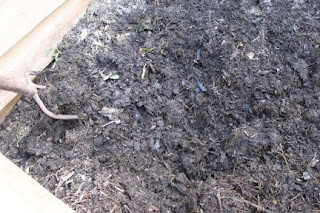 |
| Looks pretty good, right? |
I am a
 |
| No leaves this summer. |
My compost bin is built from a wonderful bracket set that I got from the Lee Valley catalog. It can accommodate sides up to four feet long, but I will tell you -- that's too big. I made some mistakes when I built mine, so you don't have to! First, don't place it right up against the fence, especially not in a corner. It's good to be able to get at it from all four sides. Second, don't plan on making your bin 4 feet by 4 feet. It's difficult to manage and difficult to fill entirely. Make it 3 feet by 3 feet. Third, don't cut your boards to fit exactly. Make them as long as they can be without knocking into the boards on the adjoining sides. When the bin is full, the compost presses outward, and boards cut too close will fall out of the slots.
My routine is simple: I fill a metal bin in the kitchen with food wastes (plant material only). When it's full, I dig a hole in the compost outside, stirring the big pile as best I can. I bury the fresh trimmings. In the summer, by the time the kitchen bin is full, the previous batch is already pretty far advanced. I try to bury each batch in a different spot in the big pile. When I have leaves, I spread them in a layer just before I add that week's grass clippings. Because I am cold-composting, I don't put weeds in my bin, or any sort of animal products or oils. We do get some critters in there, most notably the green fruit beetle, whose grub is big enough to have a license plate on it. The wren family teaches insect retrieval classes out there too, but they are too cagey for me to photograph well.
 |
| Green Fruit Beetle. Photo: Ron Hemberger |
I usually stop adding vegetable wastes to the pile when the weather turns cool. The compost sits quietly throughout our short winter and is ready for me to use each spring. And no, I don't sift it. It goes back to the garden as is.









.jpg)




